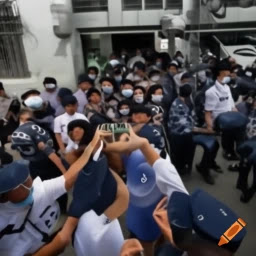The humid Manila air hung thick as Inspector Reyes sifted through the evidence. The four Chinese nationals, Wang, Wu, Cai, and Chen, sat in detention, their faces impassive. The NBI had them cold – drone footage, maps of naval installations, and enough digital breadcrumbs to build a solid espionage case. But Reyes felt a nagging unease. Something didn’t quite add up.
The official narrative painted a picture of straightforward espionage: Chinese agents gathering intel on Philippine military assets. But the sheer audacity of their actions, the brazenness of their public-facing “civic groups,” felt like a smokescreen. Reyes recalled the donations – cash to Tarlac, vehicles to police forces. Why? He knew Tarlac was a strategic point, hosting joint US-Philippine military exercises, but the donations seemed less like attempts to gather information, and more like attempts to cultivate influence.
Then there was the connection to Senior Col. Li Jianzhong, the Chinese military attaché. The repeated meetings, the opening of the civic groups’ office – it was all too blatant. Reyes had heard whispers, rumors that had circulated since Duterte’s brutal drug war. The old drug syndicates, decimated under Duterte’s iron fist, had left a vacuum. A vacuum, it seemed, that was being filled with a new, more insidious operation.
Reyes pulled up the financial records of the detained men’s “civic groups.” The numbers were staggering. Large, untraceable cash flows, originating from sources that were difficult to pinpoint. He cross-referenced the data with known drug trafficking routes and seizures. A pattern emerged: a surge in methamphetamine shipments, originating from areas linked to Chinese triads. The pieces began to fall into place.
Duterte’s war, while effective in dismantling the old guard, had inadvertently created an opening. China, under the guise of “civic engagement,” had infiltrated the Philippine underworld. The donations, the public events, the meetings with Li – it was all part of a larger strategy. Not just espionage, but a complex operation to establish a new, Chinese-controlled drug market.
The detained men weren’t just spies; they were key players in this new, lucrative enterprise. They had been building a network, cultivating relationships, and establishing a foothold in the Philippine drug trade. The information they were gathering on military installations was likely a secondary objective, a means to protect their illicit operations.
Reyes knew he was treading on dangerous ground. Accusing a foreign power of orchestrating a drug empire was a risky move, one that could have serious diplomatic repercussions. But the evidence was mounting, and the truth, however unsettling, had to be exposed. He picked up the phone, ready to report his findings, knowing that the fight against this new enemy would be far more complex and far-reaching than anyone had anticipated.
All names of people and organizations appearing in this story are pseudonyms
Exclusive: Alleged Chinese spies gave Philippine city and police cash and motorbikes

Comments